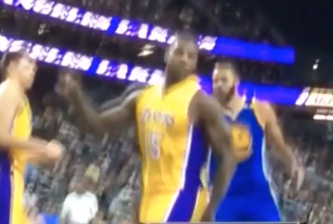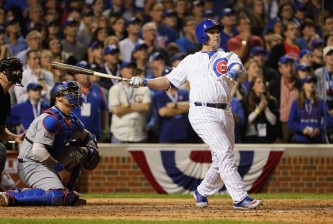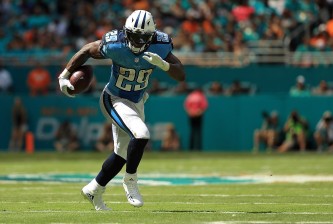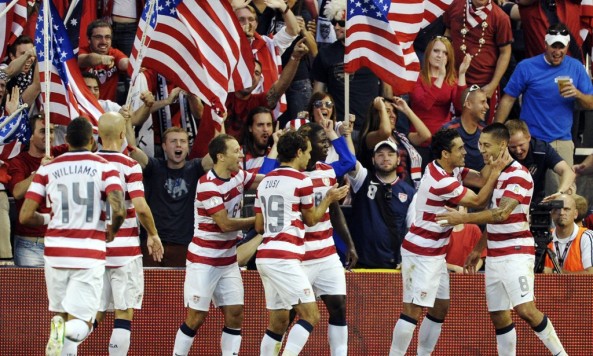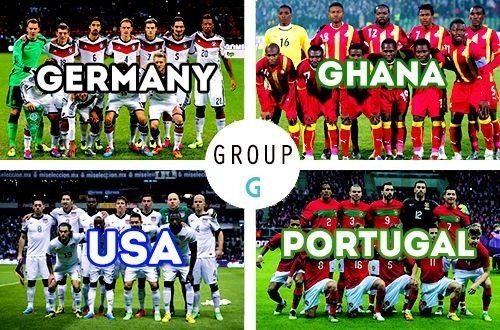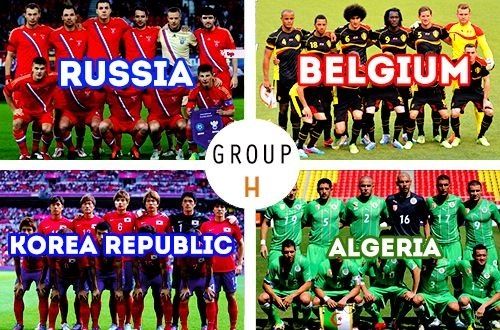Thirty-two teams divided into eight groups, each fighting to advance out of their respective groups and into the round of 16 and beyond. Here, we’ll take a look at Groups G and H, the teams and the players in them, and whether or not they’ll advance beyond the group stage.
4. USA
No Landon? No problem. At least according to manager Jurgen Klinsmann, who is clearly favoring youth over the veterans. Recently signed to a new four-year deal with added responsibilities, it’s clear that Klinsmann will be making his mark beginning with this World Cup. With rostered veterans such as Clint Dempsey (who I suspect hears footstep similar to Landon Donovan’s), Tim Howard and DaMarcus Beasley, he is banking on sprinkling the right ingredients of the veterans with youth. The question is can Klinsmann’s mixture produce a team that can make a run at this year’s World Cup? Probably not. The highest the U.S. has finished in the World Cup was third, and that was in 1930. Klinsmann was quoted in the New York Times, and said: “We cannot win this World Cup, because we are not at that level yet.” Was he trying to lower expectations for his own benefit, or perhaps motivate his team to prove him wrong? At this point, I’m willing to take him at his word.
What to watch for: When youth is referred to here, there are some players on the roster that barely have any caps. Therefore the U.S. cannot afford to have, say, a Dempsey or a Bradley go down with an injury or receive a suspension due to a red card or an accumulation of yellows due to the team’s lack of experienced depth. Look for the U.S. to try to keep possession offensively on their opponent’s side of the field, because while they arguably have the best group of goalkeepers in the Cup, their defense has been exposed as porous on several occasions.
Goalkeepers: Tim Howard (Everton), Brad Guzan (Aston Villa), Nick Rimando (Real Salt Lake)
Defenders: Matt Besler (Sporting Kansas City), John Brooks (Hertha Berlin), Geoff Cameron (Stoke City), Timmy Chandler (Nurnberg), Omar Gonzalez (LA Galaxy), Fabian Johnson (Hoffenheim), DeAndre Yedlin (Seattle Sounders FC)
Midfielders: Kyle Beckerman (Real Salt Lake), Alejandro Bedoya (Nantes), Michael Bradley (Toronto FC), Brad Davis (Houston Dynamo), Mix Diskerud (Rosenborg), Julian Green (Bayern Munich), Jermaine Jones (Besiktas), Graham Zusi (Sporting Kansas City), DaMarcus Beasley (Puebla)
Forwards: Jozy Altidore (Sunderland), Clint Dempsey (Seattle Sounders FC), Aron Johannsson (AZ Alkmaar), Chris Wondolowski (San Jose Earthquakes)
3. Ghana
Having beaten the U.S. team in the past two World Cups, this team will not lack confidence, and the opener pits the U.S. against Ghana in what will probably be a must-win game for both teams. Look for Ghana to play a more physical style of play while ceding time of possession, relying instead on a diet of counter attacks and free kicks. They will also depend on their players’ experience against the relative inexperience of some of the members of the U.S. squad.
What to watch for: In order to qualify for the World Cup, the quality of the teams that Ghana faced were less than top flight, and this might prove to be a disadvantage, having had an easier ride up until this point. Also, some of their key players are aging and injured. Michael Essien is critical to any success they might have, but the midfielder has played hurt this season and while he will be pivotal in the central midfielder role, it would seem that his effectiveness might be hampered by his injuries.
Goalkeepers: Fatau Dauda (Orlando Pirates), Adam Kwarasey (Stromsgodset), Stephen Adams (Aduana Stars)
Defenders: Samuel Inkoom (Platanias), Daniel Opare (Standard Liege), Harrison Afful (Esperance), John Boye (Rennes), Jonathan Mensah (Evian), Rashid Sumalia (Mamelodi Sundowns)
Midfielders: Michael Essien (AC Milan), Sulley Muntari (AC Milan), Rabiu Mohammed (Kuban Krasnodar), Kwadwo Asamoah (Juventus), Emmanuel Agyemang-Badu (Udinese), Afriyie Acquah (Parma), Christian Atsu (Vitesse Arnhem), Albert Adomah (Middlesbrough), Andre Ayew (Marseille), Mubarak Wakaso (Rubin Kazan)
Forwards: Asamoah Gyan (Al Ain), Kevin-Prince Boateng (Schalke), Abdul Majeed Waris (Valenciennes), Jordan Ayew (Sochaux).
2. Portugal
A well balanced team, yet they have historically underperformed on the world stage. They will need stellar play from their superstar Cristiano Ronaldo to advance out of the group stage. The real question is how badly Ronaldo is hurt, and how will it affect his play? There’s no doubt that he’s playing through the pain of tendonitis, and it will affect his game and the results of his team.
Portugal not only would like to advance beyond group play, but would love nothing more than to hoist the Cup at the expense of their Iberian rival Spain, against whom they have lived in the shadows for the past two decades. For a country with a rabid fan base, this team has yet to win a major trophy, and time is running out for a lot of the veterans.
What to watch for: Can the more senior members of the squad shine in a game where speed and agility are critical to the team’s success? Look for a 4-3-3 formation from Portugal, and how many touches of the ball Ronaldo is able to get. He will be their catalyst. The more touches he gets, the better Portugal’s chance of advancing beyond group play. On defense, Pepe must avoid his tendency of scuffling with opponents needlessly or worse, being shown a red card for their defense to hold together. Of course, in this group of death, there are other weapons opponents have at their disposal. A Ghanaian witchdoctor claims he cast the injury spell on Ronaldo.
Goalkeepers: Rui Patricio (Sporting), Beto (Sevilla/ESP), Eduardo (Braga)
Defenders: Andre Almeida (Benfica), Bruno Alves (Fenerbahce/TUR), Fabio Coentrao (Real Madrid/ESP), Joao Pereira (Valencia/ESP), Neto (Zenit St. Petersburg/RUS), Pepe (Real Madrid/ESP), Ricardo Costa (Valencia/ESP)
Midfielders: Joao Moutinho (Monaco/FRA), Miguel Veloso (Dynamo Kiev/UKR), Raul Meireles (Fenerbahce/TUR), Ruben Amorim (Benfica), William Carvalho (Sporting)
Forwards: Cristiano Ronaldo (Real Madrid/ESP), Eder (Braga), Helder Postiga (Lazio/ITA), Hugo Almeida (Besiktas/TUR), Nani (Manchester United/ENG), Rafa (Braga), Varela (FC Porto), Vieirinha (Wolfsburg/GER)
1. Germany
While loaded with talent, injuries may play a role in their advancement beyond the group stage. Schweinsteiger at this point is hobbled with a knee injury, Lahm and Neuer are hurt but are expected to recover in time for their matches, and Lars Bender suffered an injury during training and is out for the tournament. His replacement, Sami Khedira, is just returning after suffering an ACL injury last November and will have to work his way back to match fitness. In the 2006 World Cup, they finished in third place and 500,000 of their fans came out to cheer on their heroes at the Brandenburg Gate. Their manager at the time was none other than Klinsmann, the current manager of the U.S. squad. Under Lowe in the 2010 World Cup, they again finished in third place, losing to Spain before beating Uruguay. They also became the first team since Brazil in 1982 to record the highest goal differential in a World Cup without winning it. Perhaps more than other teams, their motivational levels will be high.
What to watch for: Manager Joachim Loew will have his squad motivated and ready to advance beyond the group stages, but as noted before, if their key players sustain further injury, it will be difficult for Loew’s boys to make a serious run for the Cup. In typical Loew fashion, look for the German midfield to control the tempo of the game.
Goalkeepers: Manuel Neuer (Bayern Munich), Roman Weidenfeller (Borussia Dortmund), Ron-Robert Zieler (Hannover)
Defenders: Jerome Boateng (Bayern Munich), Erik Durm (Borussia Dortmund), Kevin Grosskreutz (Borussia Dortmund), Benedikt Howedes (FC Schalke), Mats Hummels (Borussia Dortmund), Philipp Lahm (Bayern Munich), Per Mertesacker (Arsenal)
Midfielders: Julian Draxler (Schalke), Matthias Ginter (Freiburg), Mario Gotze (Bayern Munich), Christoph Kramer (Borussia Monchengladbach), Sami Khedira (Real Madrid), Toni Kroos (Bayern Munich), Mesut Ozil (Arsenal), Bastian Schweinsteiger (Bayern Munich)
Forward: Miroslav Klose (Lazio), Thomas Muller (Bayern Munich), Lukas Podolski (Arsenal), Marco Reus (Borussia Dortmund), Andre Schurrle (Chelsea).
4. Algeria
Currently ranked 25th worldwide by FIFA, the Desert Foxes have qualified four times for the World Cup, including the last two. They failed to advance beyond the group stage, however, although the games were kept close. In 2010, they lost two games by a 1-0 margin (including losing to the U.S. when Landon Donovan scored a goal in extra time), and tied England 0-0. Aside from Honduras, they were the only team not to score a goal in the 2010 World Cup. Expect a similar style of play in this Cup as well, with a stifling defense and an opportunistic offense. It is highly unlikely that Algeria will advance beyond the group stage, although if the game is kept close, anything can happen.
What to watch for: They will play a bunker-type defense while looking for a counterattacking goal. Their opponents can expect to face a one-forward offense with an attacking midfielder for support.
Goalkeepers: Mohamed Lamine Zemmamouche (USM Alger), Rais Mbolhi (CSKA Sofia), Cedric Si Mohamed (CS Constantine)
Defenders: Carl Medjani (Valenciennes), Aissa Mandi (Reims), Madjid Bougherra (Lekhwiya), Faouzi Ghoulam (Napoli), Rafik Halliche (Academica),Essaid Belkalem (Watford), Liassine Cadamuro (Real Mallorca), Djamel Mesbah (Livorno), Mehdi Mostefa (Ajaccio)
Midfielders: Sofiane Feghouli (Valencia), Saphir Taider (Inter Milan), Medhi Lacen (Getafe), Abdelmoumen Djabou (Club Africain), Yacine Brahimi (Grenada), Nabil Bentaleb (Tottenham), Hassan Yebda (Udinese), Riyad Mahrez (Leicester)
Forwards: Islam Slimani (Sporting Lisbon), Hilal Soudani (Dinamo Zagreb, Nabil Ghilas (Porto).
3. South Korea
The Warriors have enjoyed some success within their Asian grouping, but have struggled outside of their geographic zone. They advanced to the round of 16 in 2010, losing to Uruguay 2-1. They have a team steeped in youth and will rely on speed on the flanks to advance the ball down the field. They are currently ranked 55th by FIFA, so why have I put them in front of Algeria? They have played the following teams in international friendlies since November 2013: Switzerland, Russia, Costa Rica, Mexico, United States and Greece, all teams that have also qualified for the World Cup. While I don’t see them advancing out of the group stage, I believe this level of competition will serve them well in the group stage.
What to watch for: South Korea can be expected to try to push the ball up the field as quickly as possible, using pace as an advantage while trying to keep the opponent out of their final third, since their defense has been somewhat porous in recent matches.
Goalkeepers: Jung Sung-ryeong (Suwon Bluewings), Kim Seung-gyu (Ulsan Horang-i), Lee Bom-young (Busan I’Park)
Defenders: Kim Jin-soo (Albirex Niigata), Yun Suk-young (QPR), Kim Young-kwon (Guangzhou Evergrande), Hwang Seok-ho (Sanfrecce Hiroshima), Hong Jeong-ho (Augsburg), Kwak Tae-hwi (Al Hilal), Lee Yong (Ulsan Horang-i), Kim Chang-soo (Kashiwa Reysol)
Midfielders: Ki Seung-yeung (Sunderland), Ha Dae-sung (Beijing Guoan), Han Kook-young (Kashiwa Reysol), Park Jung-woo (Guangzhou R&F), Son Heung-min (Bayer Leverkusen), Kim Bo-kyoung (Cardiff City), Lee Chung-yong (Bolton), Ji Dong-won (Augsburg)
Forwards: Koo Ja-cheol (Mainz), Lee Keun-ho (Sangju Sangmu), Park Chu-young (Arsenal), Kim Shin-wook (Ulsan Horang-i)
2. Russia
While ranked 18th in FIFA rankings, the biggest improvement for Russia might not be their players. But their current manager, Fabio Capello, who has brought a more disciplined, team-oriented approach. He has not shied away from controversy, having opted not to place prior team captain Andrey Arshavin on his roster and replacing him with a younger player with less experience but more pace. Almost all of his players play their club soccer in Russia, and most are almost unknown outside of Russia. But they are a tough team to dissect and play well as a unit, in typical Capello form.
What to watch for: A gritty, unselfish, team first style of play. Russia have not qualified for the Cup since 2002, and did not advance beyond the group stage. Look for Russia to get beyond the group stage, and after that, who knows? They’ll be hungry for a good showing as a springboard for 2018, when they’ll be the host country. And with Capello running the show, expect the unexpected.
Goalkeepers: Igor Akinfeev (CSKA Moscow), Yury Lodygin (Zenit St Petersburg), Sergei Ryzhikov (Rubin Kazan)
Defenders: Alexander Anyukov (Zenit St Petersburg), Alexei Berezutsky (CSKA Moscow), Vasily Berezutsky (CSKA Moscow), Sergei Ignashevich (CSKA Moscow), Georgy Shchennikov (CSKA Moscow), Vladimir Granat (Dynamo Moscow), Alexei Kozlov (Dynamo Moscow), Andrei Yeshchenko (Anzhi Makhachkala), Dmitry Kombarov (Spartak Moscow), Andrei Semenov (Terek Grozny)
Midfielders: Igor Denisov (Dynamo Moscow), Yury Zhirkov (Dynamo Moscow), Alan Dzagoev (CSKA Moscow), Yury Gazinsky (FC Krasnodar), Roman Shirokov (FC Krasnodar), Denis Glushakov (Spartak Moscow), Pavel Mogilevets (Rubin Kazan), Viktor Faizulin (Zenit St Petersburg), Oleg Shatov (Zenit St Petersburg)
Forwards: Vladimir Bystrov (Anzhi Makhachkala), Alexander Kerzhakov (Zenit St Petersburg), Artem Dzyuba (Rostov), Alexei Ionov (Dynamo Moscow), Alexander Kokorin (Dynamo Moscow), Maxim Kanunnikov (Amkar Perm), Pavel Pogrebnyak (Reading), Alexander Samedov (Lokomotiv Moscow)
1.Belgium
Here is a team that has not played in a World Cup since 2002, which effectively ended their Golden Era. Yet the reasons start with their manager, Marc Wilmots, a man who apprenticed under Dick Advocaat and was nicknamed the “war pig” during his playing days as a midfielder. His team is steeped in talent, a product of the country’s 10-year plan to improve the national team in the future by developing their most promising youth players to their fullest potential from the start.
The results are clear: The Red Devils have a very youthful squad, yet almost half of the team play on the English Premier League, while most of the rest play for top notch squads. In April, the Belgian Federation extended Wilmots’ contract into 2018 and beyond the next World Cup, demonstrating their confidence in how their plan was proceeding. The “New Golden Generation”, as they are referred to now, will have much to prove in tournament play, but most analysts see them advancing well beyond the group stage and to the quarter-finals.
What to watch for: With a lightning-quick offense combined with a solid midfield and stout defense, this team is steeped in talent and should only get better with time. Look for them to play a 4-3-3 formation to take advantage of their talent and speed. Currently ranked 11th in the FIFA rankings, this is a team that was similarly ranked 77th in 2007. Clearly their Golden generation has begun.
Goalkeepers: Thibaut Courtois (Chelsea), Simon Mignolet (Liverpool), Koen Casteels (Hoffenheim), Silvio Proto (Anderlecht)
Defenders: Toby Alderweireld (Atletico Madrid), Anthony Vanden Borre (Anderlecht), Laurent Ciman (Standard Liege), Jan Vertonghen (Tottenham), Vincent Kompany (Manchester City), Daniel Van Buyten (Bayern Munich), Thomas Vermaelen (Arsenal), Nicolas Lombaerts (Zenit)
Midfielders: Axel Witsel (Zenit), Steven Defour (Porto), Marouane Fellaini (Manchester United), Nacer Chadli (Tottenham), Moussa Dembele (Tottenham), Kevin De Bruyne (Wolfsburg), Adnan Januzaj (Manchester United), Eden Hazard (Chelsea)
Forwards: Dries Mertens (Napoli), Kevin Mirallas (Everton), Romelu Lukaku (Chelsea), Divock Origi (Lille)
[Photo credits: Pinterest, (Group G & Group H)]
Missed any of the other group previews? No problem! Check them all out [here].




















